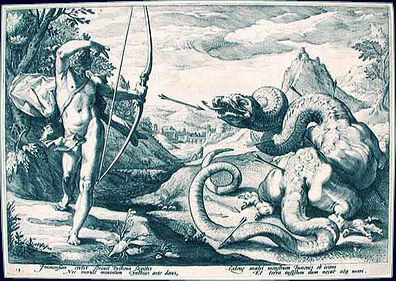The Chariot of Apollo
The rise of Greek culture brings a shift in tone. Rather than the serpent seen as equal to the bird, in Greek myths the creature is painted in an inferior light. The serpent has become a monster, relegated to the position of a subordinate entity to be vanquished by male sky or sun gods and heroes.
Jason kills the dragon guarding the tree on which the Golden Fleece hangs; Hercules slays Ladon, the serpent keeping watch over the tree of golden apples in the garden of the Hesperides; Zeus dispatches Typhon, the serpent-like monster created by Gaia to challenge his sovereignty; and Apollo conquers Python, the serpent offspring of Gaia that guards the sacred cave of the Oracle at Delphi.
A far cry from the unified lands of ancient Egypt, the myths of Greece give the impression of an uneasy imbalance.
Zeus, having disposed of all the Titans, now fancied he would enjoy the power so unlawfully obtained; but Gæa, to punish him for depriving her children of their birthright, created a terrible monster, called Typhœus, or Typhon – “Typhon huge, ending in snaky twine,” as Milton called him.
…A long and fierce struggle ensued, at the end of which Zeus, again victorious, viewed his fallen foe with arrogant pride.H.A.Guerber, The Myths Of Greece And Rome
These myths, describing powerful male Gods and heroes vanquishing serpentine beasts created by Mother Earth, suggest Man conquering his base instincts.
Ancient Greece marks the rise of Western Civilisation. It is no accident that the same culture that gave us myths of male, solar dominance over female, earthly forces, also gave us Socrates, Aristotle and Plato, great thinkers who set the stage for the rise of rational, logical thought.
Rational thought is the cornerstone of Western Civilisation.
The Greeks conceived of nature as following general rules, not acting according to the whims of gods… They saw human beings as having a capacity for rational thought, a need for freedom, and a worth as individuals. Although the Greeks never dispensed with the gods, they increasingly stressed the importance of human reason and human decisions. They came to assert that reason is the avenue to knowledge and that people - not gods - are responsible for their own behavior. In this shift of attention from the gods to human beings, the Greeks broke with the mythmaking orientation of the Near East and created the rational outlook that is a distinctive feature of Western civilizations.Marvin Perry, Western Civilization: Ideas, Politics, and Society
The myths of Greece are thus a mirror to what is taking place at the time. The developing ego and rational mind call for a suppression of the instincts. In many ways this is a positive thing: humankind rising out of its animalistic origins. But the instincts are far more than mere primitive urges; they represent a deep connection to the natural world, an intuitive link to the universal web of life.
The transition is not a smooth one.
There is at the time a fierce struggle taking place between two schools of thought: the Platonists, who represent the new, solar way of thinking, and the Sophists, who represent the old, earthly/lunar way of thinking.
Platonists believe there is an objectively verifiable ‘truth’ out there. Sophists believe that we create our own truths.
The Platonist way of thinking has ‘masculine’ qualities: order, rigidity, structure, objectivism; whereas the ideas of the Sophists are more ‘feminine’ in nature, embracing fluidity, change and subjectivism.
Plato has to go up against the Sophists to get his ideas accepted. He eventually argues his opponents down and relegates them to the subordinate status they will endure as rational thought and Western Civilisation blossom.
The Sophists are denigrated to such an extent that the word ‘sophistry’ comes to be a wholly negative term, describing “the use of fallacious arguments, especially to deceive.” (O.E.D.)
It is this battle between Plato and the Sophists that provides the focal point for Zen and the Art of Motorcycle Maintenance.
Phaedrus reads further and further and into pre-Socratic Greek thought to find out, and eventually comes to the view that Plato’s hatred of the rhetoricians was part of a much larger struggle in which the reality of the Good, represented by the Sophists, and the reality of the True, represented by the dialecticians, were engaged in a huge struggle for the future mind of man. Truth won, the Good lost, and that is why today we have so little difficulty accepting the reality of truth, and have so much difficulty accepting the reality of Quality, even though there is no more agreement in one area than the other.Robert Pirsig, Zen and the Art of Motorcycle Maintenance
It would be mistaken to suggest that Apollo’s defeat of Python marks a sudden and complete suppression of the old ways. At Delphi, under Apollo’s patronage, the oracular pythonesses continue to flourish, their connection to the deeper mysteries held in great regard among the people of the ancient world. Furthermore, the bright sun god shares his temple with Dionysus, the wild-spirited nature god of revelry and discord. One perspective is that Apollo’s victory suggests a taming of the instincts rather than a suppression. But a trend has been set in motion and the pendulum has further yet to swing.

Apollo slaying Python, by Goltzius

 TOP
TOP NEXT
NEXT